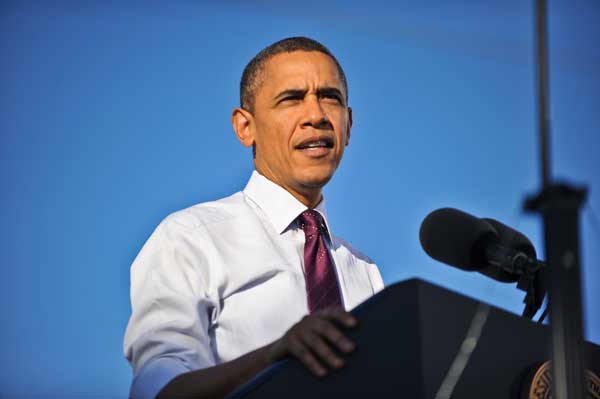For a National Prayer Breakfast, President Obama’s laundry list of religious freedom concerns was awfully…international. No mention of Hobby Lobby, the contraceptive mandate, prayer in public schools, same-sex marriage, or the countless other domestic religious liberty issues currently dividing America.
The president’s brief speech side-stepped the political minefield of domestic politics to focus on more global issues. Here are some choice quotes from his speech followed by my analysis of what they mean.
“We see governments engaging in discrimination and violence against the faithful. Sometimes religion is twisted in an attempt to justify hatred and persecution against other people just because of who they are, how they pray, or who they love.”
“Who they love” is no doubt a reference to homosexuality and the political and religious persecution LGBT communities face around the world, often in the name of religion.
“We believe in the inherent dignity of every human being, a dignity that no earthly power can take away. Central to that dignity is freedom of religion, the right of every person to practice their faith how they choose, to change their faith if they choose or to practice no faith at all, and to do this free of persecution and fear.”
One of the president’s increasingly common nods to atheists.
“Nations that uphold the rights of their people, including freedom of religion, are ultimately more just, peaceful and successful. Nations that do not uphold these rights sew the bitter seeds of instability and violence and extremism. So freedom of religion matters to our national security.”
The emerging politicized argument that religious freedom isn’t just about human rights. More and more so, religious freedom is being championed as good for business, democracy and national security.
“It’s in our interest even with our partners, sometimes with our friends to stand up for universal human rights. So promoting religious freedom is a key objective of U.S. foreign policy. I’m proud that no nation on earth does more to stand up for freedom of religion around the world than the United States of America.”
A strong segue to start finger wagging and prodding America’s allies and foes around the world.
“Realizing China’s potential rests on upholding universal rights, including for Christians, Tibetan Buddhists and Uyghur Muslims.”
Don’t forget the Falun Gong.
“Burma’s return to the international community depends on respecting basic freedoms including for Christians and Muslims.”
Especially the Rohingya.
“No society can truly succeed unless it guarantees the rights of all people, including religious minorities. Whether they’re Ahmadi Muslims in Pakistan, Baha’is in Iran, or Coptic Christians in Egypt. In Syria, it means ensuring a place for all people, Alawites and Sunnis, Shias and Christians.”
Good, although by no means exhaustive, list of persecuted minority faith groups in the broader Middle East. The president was wise to call Ahmadis “Muslims” rather than heretics, as they’re commonly viewed in Pakistan.
“Going forward, we will keep standing for religious freedom around the world. That includes opposing blasphemy and defamation of religion measures, which are promoted sometimes as an expression of religion but in fact all too often can be used to suppress religious minorities.
Take that, Organisation of Islamic Cooperation! The OIC tried for more than a decade to push through such measures in the United Nations. Some people are worried they’re at it again. Dozens of countries around the world, including several in Europe, still have laws on the books against blasphemy, apostasy and religious defamation.
“We continue to stand for the rights of all people to practice their faiths in peace and in freedom and we will continue to stand against the ugly tide of anti-Semitism that rears its ugly head all too often.”
Given the current international climate, I’ll assume he’s talking about anti-Semitism in Europe, especially in France, rather than in the U.S. Oh…and Israel.
“I look forward to nominating our next ambassador-at-large for international religious freedom to help lead these efforts.”
The last person in this position, Suzan Johnson Cook, left to make more money. The search for a new ambassador-at-large has been going on for a while. Here are some likely candidates. Glad to see he hasn’t forgotten…
“Let us never forget those who are persecuted today, among them Americans of faith. We pray for Kenneth Bae, a Christian missionary held in North Korea for 15 months, who was sentenced to 15 years’ hard labor. The United States will continue to do all in its power to secure his release, because Kenneth Bae deserves to be free.
“We pray for Pastor Saeed Abedini. He’s been held in Iran for more than 18 months, sentenced to eight years in prison on charges related to his Christian beliefs. As we continue to work for his freedom today, again we call on Iran’s government to release Pastor Abedini so that he can return to the loving arms of his wife and children in Idaho.”
These are the two I expected him to mention. Given the speech’s international focus, he might have also highlighted some high-profile cases from this list, including Christian Asia Bibi imprisoned in Pakistan on blasphemy charges. A nod to Alexander Aan, the Indonesian atheist released from prison last week, might have added some optimism.
“As we pray for all prisoners of conscience, whatever their faiths and wherever they’re held, let’s imagine what it must be like for them. We may not know their names, but all around the world there are people waking up in cold cells, facing another day of confinement, another day of unspeakable treatment, simply because they are affirming God. Despite all they’ve endured, despite all the awful punishments, they will wait for that moment when the guards aren’t looking, when they can close their eyes and bring their hands together and pray. In those moments of peace and grace and moments when their faith is tested in those far away cells, I believe their unbroken souls are made stronger.”
Moving finale.






